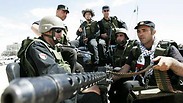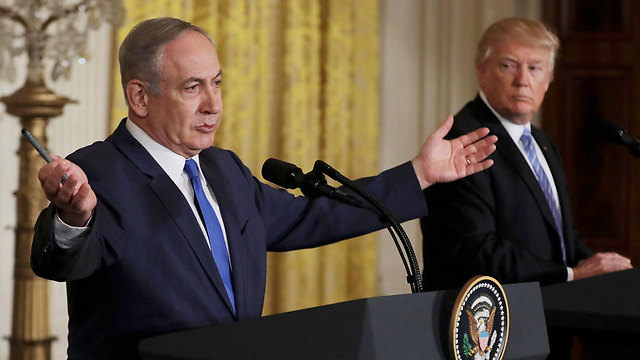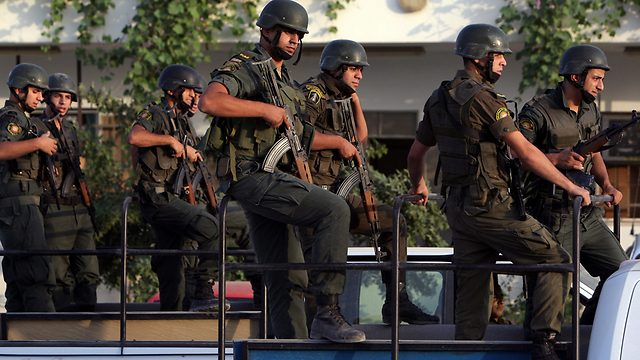
The Costa Rica case: A demilitarized Palestinian state is a win-win for all
Op-ed: Netanyahu recently raised the possibility of using the Costa Rica model for a Palestinian state. The Central American nation, after a popular armed rebellion, decided to forego its military in favor of separate functional police forces. Since then, it has fought no wars and experienced no significant acts of domestic violence and its defense budget has been going to education. Can the Palestinians adopt this model?
Seen as Prime Minister Benjamin Netanyahu used Costa Rica as a good model for a potential Palestinian state in his visits to the US and Australia, it may be worth examining the merits of this possibility. As interested Israelis, we have been researching—together with Palestinian and Costa Rican academics—how best to learn from the positive experience of the demilitarization of one of Latin America's most democratic republics. We argue that non-militarization is the optimal strategy for the enlightened self-interest of the Palestinians—but not just as an enemy’s a priori demand.
In 1948, an armed popular rebellion was waged in Costa Rica against the military serving the fraudulent government leader, President Teodoro Picado. The revolt was successful, with the rebels taking control of the country, while suffering about 500 casualties out of a population of less than a million at the time.
Instead of having a strong police force and running the risk it could become a powerful national guard that would replace the army—as happened in neighboring Panama—the wise Costa Ricans established several separate functional police forces: judiciary, border control, urban police, etc.

After the disbandment of Costa Rica's army, there have been attempted invasions from Nicaragua in the north, both from the dictatorship of the Somoza family as well as the Sandinista rule that followed. The Costa Ricans' alertness and, above all, the Inter-American Reciprocal Defense Treaty, provided deterrence, including support from the air forces of the much larger countries, such as Mexico and Venezuela.
Since then, Costa Rica has not fought in a war nor experienced any significant acts of domestic political violence. Instead of investing in war and security, the defense budget now goes into education. For this political and moral position of strength, Costa Rica’s President Óscar Arias was awarded the Nobel Peace Prize four decades later for “exporting” democracy to the rest of Central America. The proven principle of mutual defense that “established democracies do not fight wars with each other,” has been also vigorously supported by Natan Sharansky and Ron Dermer's book The Case for Democracy.
For this and perhaps other variables, Costa Rica ranks 14th in the World Index of Happiness, the first among Latin American countries. Israel ranks even higher, at 11, while the Palestinian territories rank among the lowest, at 108. This asymmetry is part of the problem.
Can Israel’s prime minister dictate to the Palestinians that they must follow Costa Rica's example, while at the same time—just in case—keeping the IDF controlling their entire country? His threatening, patronizing tone and demanding attitude is perceived by the Palestinian as something they have no choice but to accept. Netanyahu would be wise to remember, however, the culture of honor and pride prevalent in the Middle East.
The Palestinian case has similarities and differences to Costa Rica. There is no Palestinian army, which makes it easier to overcome the difficult task of dismantling an army. The existing Palestinian Preventive Security Force has no heavy arms, such as tanks, planes or artillery. They are no match against Israel. But while the “Lion of Judea” is indeed the King of the Jungle, a swarm of bees can still cause terrible pain to the lion. Hence, the future Palestinian state could be seen as “non-militarized” but still serve as a reminder that while Israel can win wars, it cannot impose peace.
In Costa Rica, the disbandment of the army was not a dictate or demand by an enemy neighbor. The Patio de Agua declaration was self-proclaimed and popular. In interviews conducted with political, civil society and activist leaders in the West Bank, we found that there is overwhelming support for this idea. The main reason they support a Palestine without a military is simple: they want to be a democracy. They do not want to be another Arab a kingdom or a military dictatorship. Many hope to be much more like Israel than other Arab countries. For most of them as refugees—like we Jews were—emphasis on education is very important, as you can often carry nothing with you but your own people’s bright minds.
The armies of Arab nations have killed more Palestinians than the Israelis did—in Lebanon, Jordan and Syria. An international force in the Jordan Valley, including Israelis defending the Palestinian border from neighboring Arab countries, shielding Palestinians from the massacres taking place around them, will provide deterrence that a Palestinian force could not offer.
Pragmatically, the Palestinians understand that they are no match for these countries, and that an attempt to catch up would require spending unprecedented sums. Realistically, they would have no airspace for their fighting planes to fly in, or waters for their naval vessels to patrol or carry out reconnaissance missions.
In this heavily armed Middle East, no money, space or experience can keep them as safe as regional alliances, accords endorsed by the “Quartet” (United States, Russia, UN and EU), and peacekeeping forces. If Israel could be part of an international force present in the Jordan Valley to prevent any threat posed by non-democratic regimes, it can be seen, and sold, as a blessing to all.
With some reserved optimism, we can argue that “security” is not only a “zero-sum game” that only Israel can rightfully win. If we put ourselves in the Palestinians' shoes, focusing solely on providing security for both parties could and should be seen as a “win-win.”
From an Israeli perspective, it has always been “security first, peace later.” In hopes of making progress on one of the core issues of the conflict, and in an effort to look at the conflict from a wider perspective, we should focus on human security, which is defined as “freedom from pervasive threats to people's rights, safety and lives.” The conflict is composed of people. By addressing the fears and needs of the individual, we are combating greater national and international security risks.
Our wish is that this article comes to the attention of our prime minister and he understands that it is better to discuss non-militarization in a way that would benefit both sides. Our neighbors would have an easier time accepting this win-win scenario in security if we handle it with care rather than threats.
Even though the Israeli leadership is at an impasse on the matter, we have been continuing this study in cooperation with Palestinian and Costa Rican colleagues. One of them is Prof. Amb Rodrigo Carreras, who served twice as Costa Rica's ambassador to Israel, following the footsteps of his late father, Prof. Rev Benjamin Nunez, who also served twice in Israel.
So, a question to our prime minister: do you merely want to score political points or do you really wish to learn from experience and history? Change your tone from provocation to reconciliation, and we—and others—will all be glad to put our modest energies to the service of both Israelis and Palestinians.
In the meantime, we are going to continue with our research and conduct some simulations with our students at the Interdisciplinary Center Herzliya and at Haifa University.
Long term security correlates also with human security; can we at least agree on that?
Gal Hacohen is an MA student at Interdisciplinary Center Herzliya and teaching/research assistant to Prof. Edy Kaufman, who concurrently teaches at Haifa University and the University of Maryland.












